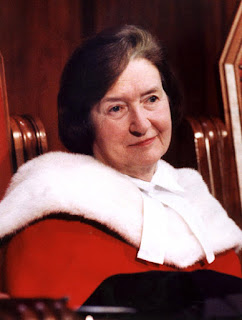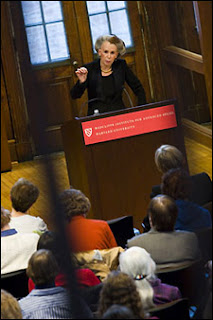In Memory of Bertha Wilson - First Female Supreme Court Judge
 “She was right there at the defining moment,” said University of Toronto law professor Brenda Cossman. “She was absolutely foundational to the emergence of Canadian Charter culture. Being the first woman to do anything is a tough role to fill. You have to be kind of exceptional - and she was. She was an incredibly influential judge.”
“She was right there at the defining moment,” said University of Toronto law professor Brenda Cossman. “She was absolutely foundational to the emergence of Canadian Charter culture. Being the first woman to do anything is a tough role to fill. You have to be kind of exceptional - and she was. She was an incredibly influential judge.”
Had Bertha Wilson meekly followed the patriarchal advice handed down to her when she inquired about doing a law degree in the mid-1950s, the Canadian judicial system might have looked very different today. "Madam, we have no room here for dilettantes. Why don't you just go home and take up crocheting," Horace E. Read, the dean of the law school at Dalhousie University barked at her when the minister's wife and former school teacher appeared before him, seeking admission to the school in the fall of 1954.
What Bertha gave us:
- Her landmark cases included one in which she created the so-called battered woman's defence for women who had killed abusive partners (R v Lavallee). In another landmark case - R v Singh - she wrote that refugee claimants must be given proper oral hearings.
- She displayed a fierce, uncompromising streak of independence; becoming known in some quarters as ‘the great dissenter.'
- “She was an imaginative judge who saw the underlying purpose of the Charter as being to protect groups that had been disadvantaged. She called it like an umpire - the way she saw it.”
- Her most famous words were probably penned in the Henry Morgentaler abortion case. While the majority reasons in the Morgentaler judgment were relatively narrow and technical, Judge Wilson wrote a concurring judgment that went well beyond her colleagues in asserting a woman's right to be free of state interference.
“It is not just a medical decision,” Judge Wilson wrote. “It is a profound social and ethical one as well. It asserts that the woman's capacity to reproduce is to be subject not to her control, but to that of the state.” - In her abortion ruling she also said, "This decision is one that will have profound psychological, economic and social consequences for the pregnant woman." She added, "It is probably impossible for a man to respond, even imaginatively, to such a dilemma."
- “She had tremendous compassion, and she could peel the onion as well as anyone I have ever known in terms of analyzing issues. In my view, her bench had the hardest job, because they had to give shape to the content of the Charter in moving forward. The first attempt at anything is the toughest.”
- She believed that the Charter ought to be read as containing social and economic rights, such as a right to welfare or housing.
- The conservative group REAL Women of Canada complained to the Canadian Judicial Council, saying Wilson had a feminist bias. The complaint was thrown out.
Bertha Wilson was born in Kirkcaldy, Scotland, on Sept. 18, 1923. She died of Alzheimer's Disease at Rideau Place on-the-River on April 28, 2007. She was 83. She is survived by John Wilson, her husband of 61 years, her brother James and two nephews. There will be a memorial service in Ottawa at 2:00 p.m. on May 8, 2007 at St. Andrew's Presbyterian Church (Wellington and Kent Streets).
LINK: Globe and MailLINK: CBC video on her appointment
























 # 41 North American Union Planned....But Quietly
# 41 North American Union Planned....But Quietly Lyda Fuller came to Iqaluit with a cheque, and also rekindled long-standing hopes that a shelter for homeless women will one day exist in the capital.
Lyda Fuller came to Iqaluit with a cheque, and also rekindled long-standing hopes that a shelter for homeless women will one day exist in the capital.














